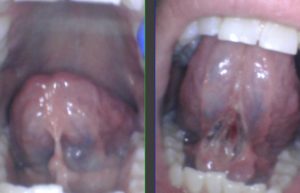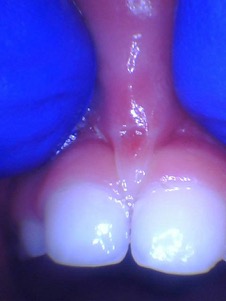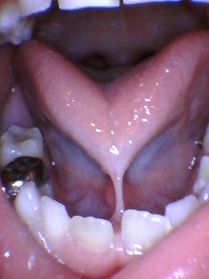Read the first four myths here.
Myth #5: “The tongue-tie will stretch, or the child will fall and break it, so it doesn’t need to be treated.”
That would be nice if it just stretched out, so we could “wait and see.” Unfortunately, this is not the case. The frenum is made of a thick webbing of fascia (connective tissue) that is itself made of dense type 1 collagen bundles, which happens to be resistant to stretching. So the most stretching you might get would be 1%, but it will not disappear, stretch out, or change over time without intervention.

38 year old with a to-the-tip tie. She did not have speech difficulty, but she had many other issues she didn’t know were related.
If your fingers are stuck together, they will not separate magically. Neither will a tongue-tie. We see 30-year-olds, 50-year-olds, even 70-year-olds still with a tight-as-ever tongue-tie. You can certainly survive with a tongue-tie, but you may have compromised function and difficulty with chewing, speech, and sleep; neck and shoulder pain; and even headaches.

36 year old who was “clipped” as a baby. And after a proper release.
A child may fall and rip the lip tie when learning to walk, or later in preschool, but this does not help the nursing mom! Trauma is not a treatment strategy.
For a preschooler, it also is not a treatment strategy. Almost always when the child falls and rips the lip-tie, it only puts a small nick in the tissue (see below) and does not remove the tissue between the teeth. When we do it properly with the laser, all the tight tissue disappears, and then the teeth can properly close. There is now nothing to prevent the migration of the teeth toward the midline (mesial drift). Gap closure works best if done before 18mo old or when the permanent teeth are erupting.

This shouldn’t need to be said, but just in case anyone hears this myth…you cannot fall and rip a tongue-tie… unless the teenager is doing a Michael Jordan-style dunk with his tongue out (which he can’t stick out anyway) and hits the rim!
Just fix it correctly the first time, and get all the restricted tissue.
Myth #6: Since treating a posterior tie is new or novel, it must be wrong.
Almost all new ideas have a certain aspect of foolishness when they are first produced. Alfred North Whitehead

Myth #7: “Just give it time, and it will improve.”

Myth #8: “They charge too much; they must be doing it for the money.”
One family received a bill from Children’s Hospital with the charges after their halfway “clip” at the pediatric ENT. For a scissors clip of the tongue, no hospital stay, just an office visit, they were billed $5,500. Their Insurance paid $3900, and they still owed close to $1,000 for a simple clip (that wasn’t even done correctly, and we had to redo)! This is 100% true. They brought me a copy of the bill.
Our fee for an exam and the tongue tie fully released with a CO2 Laser, with as many follow up visits as needed, a phone call from me personally that night to check on the baby, and we will redo it for free if required in the first year…less than $550. That’s 10x less!
Trust me; we don’t do this to get rich. Regular pediatric dentistry is more profitable than tongue-tie releases! If we only cared about money, we would not open up a business focused on treating tongue-ties.
Why do we do it then? Honestly, we do it because it is so rewarding to help these families, and they are so grateful we help them with their struggling child.
Why do we keep going despite all these myths patients report to us from other providers nearby? (Many of which are quite hurtful.) We persevere knowing that we are making a big difference for the families we help who are struggling and now see results.
When we hear that our autistic, non-verbal patient said “mama” for the first time at nine years old after his tongue-tie release, and is sleeping better, with better behavior at school, and he’s eating better too… That’s encouraging.
When you hear a child can eat without choking (finally!) at age 3, and the family can now go out to eat at a restaurant… That’s encouraging.
When a sweet, speech delayed little girl who is almost two years old with ten words now has 29 new words a week later, and she’s now sleeping soundly through the night for the first time in her life… That’s encouraging.
When we have babies who have been struggling to gain weight, crying nearly all day, are frustrated when taking the breast or bottle, and now they are content, gaining weight well, stopped spitting up, and mom says “it’s like he’s a new baby”... That’s encouraging!
Listen to these parents stories below:
To get treatment for your child, please call us to schedule a consult 205-419-4333, or send a message. We would love to talk to you about your story.
To learn more about tongue-ties, and proper treatment, please check out our multidisciplinary book on Amazon or one of our Online Courses.



